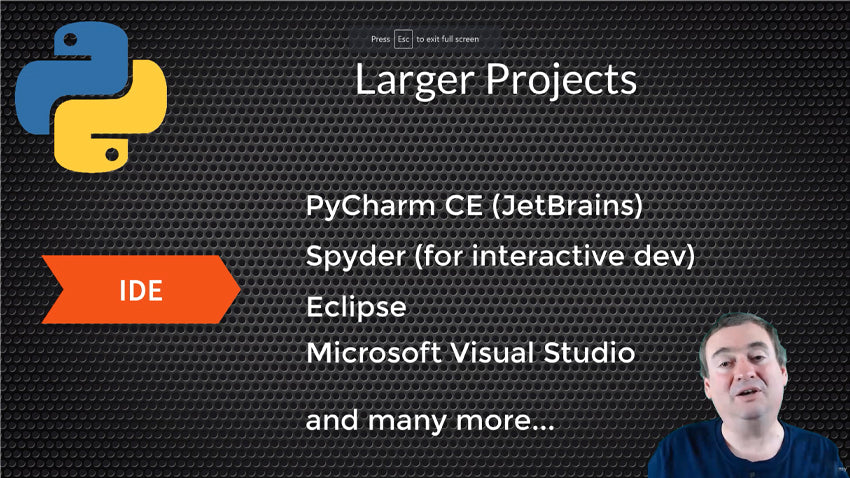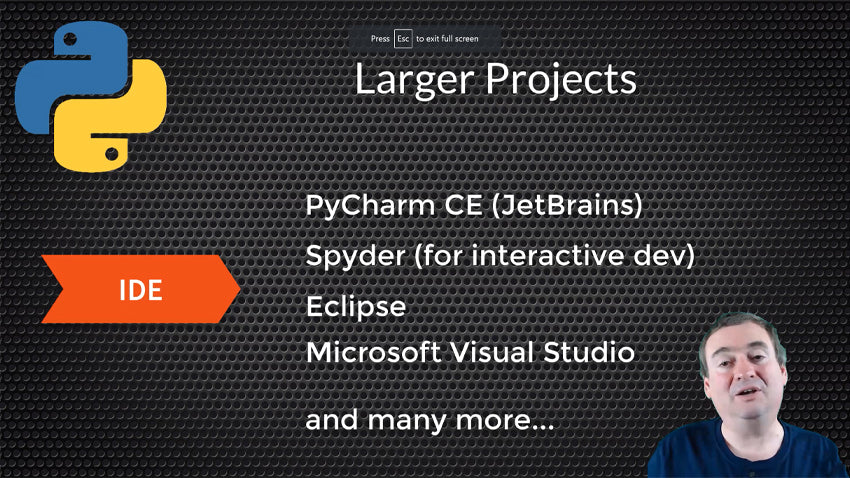84% Off Python 3: Deep Dive (Part 1 - Functional) | Udemy Review & Coupon
84% Off Python 3: Deep Dive (Part 1 - Functional) | Udemy Review & Coupon
The topics covered include variables, functions, functional programming, closures, decorators, modules, and packages.
This course covers:
Python 3: Deep Dive (Part 1 - Functional) is an incredibly comprehensive and in-depth course on Python 3 programming. It contains 46 hours of on-demand video, three articles, 172 downloadable resources, full lifetime access and access on mobile and TV. On completion of the course, you will receive a Certificate of Completion.
What you'll learn
This course will provide an in-depth exploration of Python variables, memory, namespaces and scopes. Learners will gain a deep understanding of Python’s memory management system and be able to utilize optimizations for more efficient usage. An in-depth look at numerical data types such as booleans, integers, floats, decimals, fractions, and complex numbers will result in a more thorough understanding of how they are used and manipulated within the language. Advanced boolean expressions and operators as well as callables (functions, lambda functions, closures, etc) can be utilized to create powerful code that can better manage large datasets or data streams. Additionally, learners will gain an understanding of functional programming techniques such as map reduce filter and partials that can help optimize code while improving readability.
About the author
Dr. Fred Baptiste
Fred possesses a PhD in mathematics and has been professionally programming for more than 25 years. He is proficient in various technologies and languages, including Python, Go, .Net (C# and VB), Java, C++, and JavaScript. Additionally, he has experience working with different databases such as relational SQL databases like MS SQL Server and Postgres and No-SQL databases like Clickhouse, MongoDB, Couchbase, and Neo4j.
Starting in 2011, his primary focus has been on Python, specifically in the areas of REST API development and data engineering.
He has dedicated significant time and effort to acquire a thorough comprehension of Python and producing idiomatic Python, and he wishes to impart that knowledge to you.
He has a strong interest in Python and would like to share his knowledge and enthusiasm with others.
Requirements
The requirements for the introduction to Python programming course are relatively straightforward. A basic level of understanding is needed of the core principles and syntax of Python such as variables, conditional statements, loops, functions, lists, tuples and dictionaries. In addition to this knowledge base, a development environment needs to be set up in order to get the most out of the course. This can include options such as the command line interface (CLI), PyCharm, Jupyter or any other preferred platform.
In terms of software compatibility, it is important to note that Python 3.6 or higher must be installed in order for all materials used throughout the course to work correctly and without issue. Previous versions may not support some necessary components and therefore should be avoided altogether if possible. Once these prerequisites are satisfied it is time to begin learning how powerful and versatile Python programming can be!
Description
This course is designed to give a deeper understanding of how the Python 3 programming language works. It’s designed for those who have already been coding Python for some time and are starting to wonder how more complex aspects of the language work. It’s not necessarily aimed at total beginners, and anyone considering this course should make sure they have had some practice with basic Python before tackling the topics covered here.
The questions asked in this series are usually considered advanced, considering typical programming concepts such as data structure abstractions, concurrent accesses, and multi-threading applications. So, if you consider yourself an intermediate learner interested in mastering these core aspects of the Python 3 language, then this could be the perfect course for you. You will gain an understanding of how to create high-end production codes and elevate your underlying knowledge about object-oriented programming functions.
In order to fully benefit from this course, it is recommended that one pause the coding videos and attempt to write code independently before following along with the instructor. During the videos that discuss concepts and theories, it's recommended to sit back, but for the videos that involve coding, it's best to lean in and pay close attention.
Before starting this course, it is important to review the pre-requisites listed below. While basic concepts will be briefly refreshed at the beginning, it is expected that you are already comfortable with these concepts.
This course series provides a comprehensive understanding of the Python language and standard library.
Python is commonly referred to as a "batteries-included" language due to the extensive built-in functionality that offers a wide range of possibilities for exploration and study.
The focus of this course is on Python as a language and its standard library, rather than discussing personal preferences for third-party libraries.
This course is focused on CPython. To access the fully-annotated Python notebooks, it is necessary to have Jupyter Notebooks installed.
This resource aims to assist in the exploration of Python and provide answers to questions that arise during the development process.
This course is intended for:
This course is perfect for those with a basic understanding of the Python language who wish to take it to the next level and get an in-depth understanding of Python's data structures and features. Whether someone is trying to navigate an interview or increase their technical expertise, this course provides all the tools one needs. Students learn advanced data structures such as decorators, comprehensions and iterators in addition to exploring how to apply principles of object-oriented programming to make code more modular, efficient and easy-to-maintain. Armed with such knowledge at hand, learners are able to better understand complex topics such as memory management, building robust GUIs and most importantly leveraging the expressiveness Python offers for data analysis tasks.
Overall, this course allows students with a solid foundation of Python fundamentals that want refine their skillset and build on their vocabulary in order to successfully attempt comprehensive problem solving challenges that may come up in an interview setting or working environment. Successfully completing this course opens several options related to furthering career opportunities due to depth of knowledge expanded upon through engaging materials that cover any potential questions on versatile concepts faced while using Python related technologies.
Share



I am anticipating the commencement of the upcoming course from this individual.
He simplifies complex things. I would recommend his course to individuals seeking to enhance their Python proficiency.
Waiting for password to Unlock:



